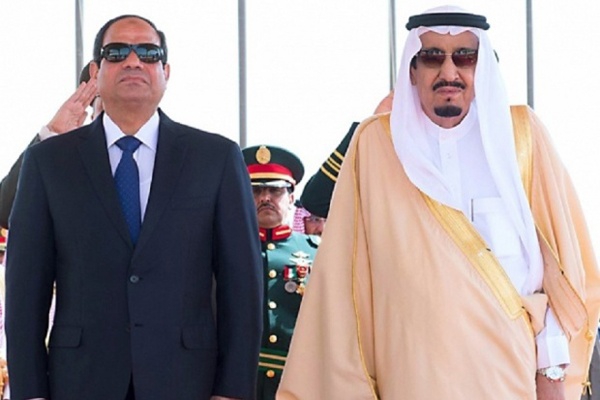Sunday 23 October 2016 - 14:52
Story Code : 236003
Egypt and Saudi Arabia; from compromise to confrontation
Saudi Arabia's King�Abdullah bin Abdulaziz was one of the main supporters of Egyptian President�Abdel Fattah�el-Sisi in toppling�Mohamed Morsi�s government. Following Sisi's seizure of�power, Riyadh, for supporting him, used all of its political, military, economic and financial tools to legitimize his government inside and outside of the country. King Salman also pursued Saudi�s policy in supporting Sisi�s government; even billions of Saudi riyals (SAR) have been spending to set up and open the new Suez Canal during his rule.
Thanking Al Saud for its supports, Sisi handed over the ownership of Red Sea islands Sanafir and Tiran�to Saudi Arabia�during the visit of Saudi King Salman�to neighboring Egypt.�But, many Egyptians protested against the move and even�the Egyptian Supreme Administrative Court, which is under Sisi�s command and can not give judgment against him rejected Cairo�s handover of the two islands to Saudi Arabia, calling it "unconstitutional".
But, that�s not all. Riyadh and Cairo disagree on some cases that are among their main priorities; one of the most important ones is the leadership of the Arab and the Islamic world and regional crises.
Cairo is seeking to once again reclaim its regional power and not to be dominated by Saudis since they are believed to be its rival. On the other hand, having Al-Azhar University, as a symbol of Islam, where thousands of Muslims are studying, Egypt thinks of itself as the leader of the Muslim world while Saudi Arabia knows itself as the center of the Islamic world. So, Egypt- Saudi Arabia�s conflict can somehow be considered Sunni-Wahhabi fight.
Since King�Salman came into�power, Saudis have been more flexible to the Muslim Brotherhood. Riyadh supports the Muslim Brotherhood in Syria and Yemen against what it calls Iranian influence in these countries.
But Cairo was not satisfied with the Saudi�s policy towards the Muslim Brotherhood, since the outlawed group is one of the Sisi�s opponents and if they take power in Syria or Yemen, Yemeni�branch of the Muslim Brotherhood will be strengthened in the country and this can shake the foundations of Sisi's power. On the other hand, Saudi Arabia hoped that Egyptian ground forces entered Yemen but it didn�t happen and Sisi, to prevent the dispatch of aid to the�Yemeni�Houthi�Ansarullah, patrols the strategic�Bab el-Mandeb�strait with its naval forces; a measure that was not even done at the request of Saudi Arabia but within the framework of Security Council resolutions and at the request of the US and Israel.
Sisi also concerns over Riyadh�s attempt to overthrow the Assad regime with the collaboration of the Muslim Brotherhood and terrorist groups as Syria without Bashar al-Assad and a legitimate government will pave the way for the terrorists to take advantage of the situation. Moreover, strengthening terrorist groups in Syria, especially ISIS, can also make them more powerful in Sinai Peninsula and this is detrimental to Egypt's national security so Syria�s integrity is of great importance to Egypt while Saudi Arabia is just seeking to topple Assad in any possible way, even by destroying Syria�s current map.
This can be seen in the last month�s events where Egyptian Foreign Minister�Sameh Shoukry�met with his Iranian counterpart Mohammad Javad Zarif, and then Egyptian representative at the United Nations supported the Russian proposal and stood on the side of Syria, Iran, and Russia and made the Saudi representative to expressly criticize him. Because of Egypt�s measure, one of Iran�s preconditions to attend the�Lausanne�talks was the presence of Iraq and Egypt in the meeting.
Iran is another point of difference between Egypt and Saudi Arabia. Sisi was never seeking to directly confront Iran and it can clearly be seen in Cairo�s policy in Syria and Yemen. However, Saudis tried to create a coalition of Qatar, Egypt and Turkey to isolate Iran in the region but the Muslim Brotherhood case failed their effort.
Therefore, because of the aforementioned reasons, Egypt-Saudi Arabia�s relations have already been strained. On the other hand, Cairo has recently shown �green light� to Iran to renew its relations with the Islamic Republic and if Tehran properly answers their request, it can be claimed that Saudi case will be closed in Egypt since Riyadh�s current policy is greatly affected by the�relations of other countries with Iran.
# Tags











